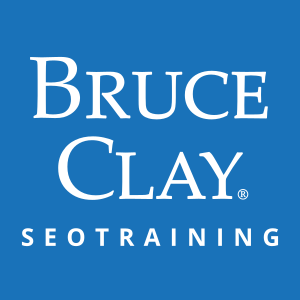Training Course Curriculum
- The Importance of SEO in the AI Era
- SEO Concepts & the New Search Landscape
- Meet the Search Engines: Then, Now, and Next
- Content for SEO & AI
- Local Search in an AI-Driven World
- Linking Strategies & Siloing Concepts
- AI Search Signals & Technical SEO
- Generative AI: What It Means for Search
- Planning, Governance & SERP Visibility Framework
- Measuring Success in an AI-First World
- FAQ: How can I leverage an SEO training course to improve my website’s search engine rankings?

Bruce Clay’s in-person SEO & AI Training gives you a framework for mastering this new landscape — built on proven SEO principles and enhanced with AI-driven strategies for SERP Visibility.
Here’s what you’ll learn over three intensive days:
The Importance of SEO in the AI Era
Even with AI disrupting search, SEO remains the backbone of digital visibility. You’ll learn why SEO matters more than ever, how AI changes the rules, and how to position your brand to thrive across all search surfaces.
Key topics:
- Why AI Overviews don’t replace SEO—they raise the stakes
- SEO as the foundation of long-term visibility
- How AI reshapes content discovery and brand presence
SEO Concepts & the New Search Landscape
From keywords to searcher intent, core SEO concepts still matter—but must be applied with an AI-first mindset. This section covers the fundamentals, then shows how AI and SERP fragmentation demand new approaches.
Key topics:
- Traditional SEO concepts reframed for AI
- Understanding user intent across AI-driven journeys
- The role of engagement signals in AI-fueled rankings
Meet the Search Engines: Then, Now, and Next
Google is no longer just a list of links. Today’s search engines are AI-powered answer engines. You’ll learn what has changed, what remains the same, and what’s coming next.
Key topics:
- The rise of AI Overviews and chat-driven results
- Voice, visual, and conversational search as new front doors
- Preparing for the next wave of algorithm updates
Content for SEO & AI
Content is no longer just for rankings—it must be structured for AI answers, voice assistants, and visual formats. You’ll learn how to create content that feeds AI, wins SERP features, and resonates with humans.
Key topics:
- Building “Quick Solutions” for AI and voice search
- How to write AI-friendly content that still feels human
- Structuring content for position zero and beyond
Local Search in an AI-Driven World
Local results remain critical for many businesses. With AI summaries and maps integrated into SERPs, local optimization has new dimensions.
Key topics:
- Optimizing for AI-driven local packs and maps
- Managing brand presence across local directories and AI platforms
- How reviews and trust signals influence AI-generated results
Linking Strategies & Siloing Concepts
Internal links and siloing aren’t just for crawl efficiency—they shape how AI understands authority and topical relevance. You’ll learn Bruce Clay’s famous siloing strategy, updated for today’s SERP Visibility.
Key topics:
- Internal linking for AI comprehension
- Siloing for authority across fragmented SERPs
- External link strategies that feed trust into AI systems
AI Search Signals & Technical SEO
AI has changed how signals are weighted. Technical SEO is now inseparable from AI readiness.
Key topics:
- AI search signals and what they mean for site performance
- Technical factors that influence AI and SERP visibility
- Core Web Vitals, crawlability, and structured data for AI-first search
Generative AI: What It Means for Search
Generative AI changes how people consume, create, and engage with content. You’ll learn how to integrate AI into workflows responsibly and effectively.
Key topics:
- The difference between AI assistants and AI agents
- Safe AI adoption for SEO and content teams
- Scaling AI-powered content without losing trust or E-E-A-T
Planning, Governance & SERP Visibility Framework
The future of SEO isn’t about rankings—it’s about orchestrating visibility across the entire search ecosystem. Bruce Clay’s SERP Visibility Framework gives you a system to make that happen.
Key topics:
- The 4-part SERP Visibility Framework: Diagnose, Prioritize, Build, Govern
- How to lead cross-functional “Search War Rooms”
- Building governance models that keep SEO integrated with marketing, dev, and content
Measuring Success in an AI-First World
Old KPIs aren’t enough. You’ll learn how to measure visibility where it counts—in AI answers, snippets, and beyond.
Key topics:
- Tracking brand presence in AI search
- New SEO metrics for AI visibility and engagement
- Reporting ROI to executives in business terms
Daily Ask-Me-Anything Q&A
Each day closes with a live Q&A with Bruce Clay. Bring your challenges, and get answers tailored to your role, your team, and your business.
FAQ: How can I use an SEO training course to improve my website’s search engine rankings?
If you are planning to get the most out of an SEO course, you first need to focus on learning basic SEO fundamentals. Once you’ve mastered these, you can move on to more advanced concepts. Quality SEO classes allow you to dive headfirst into keyword research, which involves targeting terms that your audience frequently searches for. This is one of many pillars of SEO.
On-page and off-page SEO are two topics you’ll explore in top SEO courses. On-page SEO is all about combing through your site page by page and making improvements for rankability. You’ll use optimized meta tags, headings, and image alt texts. On the other hand, off-page SEO refers to efforts that extend far beyond your web code, such as backlinking and social media.
SEO training can also help you learn the ins and outs of search engines. Understanding how search engine giants like Google rank pages can clarify ranking factors pertaining to algorithms, content, experience, and mobile accessibility. SEO course participants learn how to strategically react to each update in order to maintain or advance their SERP ranking positions.
Analytics instruments are another important component of SEO. An SEO course will likely introduce you to Google Analytics, Google Search Console, and other common data-gathering tools. These will be essential in helping you understand searcher behavior and make relevant optimization improvements.
If you are dealing with stagnant or dwindling search rankings, you can benefit from a formal SEO course, where you’ll learn to make data-driven decisions for your website.
Buyer intent search phrases are another facet of SEO training. These are search terms and phrases indicating that a searcher intends to purchase something. Applying these words in your SEO strategy will do wonders for your conversion rate.
The practical implementation of SEO skills applies to content optimization, too. High-quality content that resonates with site visitors and is SEO-friendly is effective. Make readers stick around by offering insightful blogs, tutorials, or how-to articles to build niche authority; they will be motivated to continue reading.
SEO is a field that requires you to learn continuously. From algorithm changes to industry standards, there is plenty to learn to gain a competitive edge. An SEO course is an excellent way to stay ahead of the curve.
